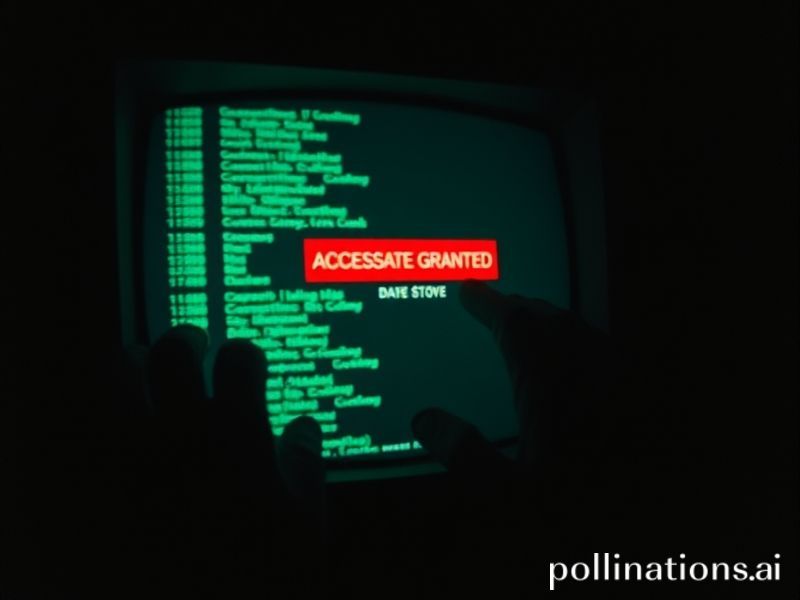World Holds Breath as ‘Operation Schrödinger’s Data’ Proves We’re All One Click from Medieval Times
The Hack: A Global Rehearsal for the Next Apocalypse
By “Spengler in a Suit,” Senior Correspondent, Dave’s Locker
Somewhere between a ransomware note written in Comic Sans and the sight of a Belgian chocolate factory grinding to a halt because its servers now speak only Russian, humanity received another gentle reminder that we are one misplaced semicolon away from the Middle Ages—only with worse Wi-Fi.
The hack in question—let’s call it “Operation Schrödinger’s Data,” because the files are both leaked and not leaked until you pay—began, as all epoch-shaping disasters do, with an intern clicking “Enable Content.” Within 72 hours, the contagion had hopscotched from a midsize law firm in Perth to the port scheduling system of Rotterdam, then onward to the credit-card processor that keeps South America’s avocado toast economy liquid. By the time anyone important had finished their weekend in the Hamptons / Mykonos / a discreet dacha, 2.3 exabytes of sensitive chatter—medical records, diplomatic cables, the usual OnlyFans receipts—were frolicking across the dark web like spring lambs.
Global Context: Same Circus, Bigger Tent
In the grand bazaar of geopolitics, the hack is less a singular event than a recurring item on the clearance rack. Washington blamed “state-adjacent actors,” which is Beltway argot for “someone we can’t bomb yet.” Moscow issued its traditional non-denial denial between two morning invasions. Beijing offered to mediate, provided everyone used Huawei routers. Meanwhile, the EU convened an emergency Zoom—password: “Solidarity2024!”—where 27 commissioners agreed to draft a strongly worded font.
Yet the true significance lies not in who did it, but in how effortlessly the world folded. Supply chains stuttered, insulin shipments froze in customs, and a Nigerian prince discovered his inheritance was now collateral in a Bulgarian crypto-laundry. The lesson: twenty-first-century civilization is basically a Jenga tower made of Post-it notes.
Worldwide Implications: Everyone Gets a Trophy of Inconvenience
For the Global South, the hack was the financial equivalent of finding out the bank’s ATM runs Windows 95. Kenya’s mobile-money rails coughed, and street vendors reverted to the barter system—three mangoes for one conspiracy theory. In Southeast Asia, factories that assemble 40 % of the planet’s semiconductors discovered their “air-gapped” networks were more like “air-kissed”: a polite fiction. Even Switzerland—neutral since 1815, smug since forever—had to postpone the release of its annual bribery index, ironically because someone bribed the wrong sysadmin.
Developed nations fared no better. Tokyo’s bullet-train displays showed only a looping GIF of a laughing skeleton wearing an Anonymous mask. France shrugged, lit a Gauloise, and declared the outage “an unexpected holiday.” Only New Zealand noticed nothing; their sheep-based economy remains delightfully analog.
Broader Significance: The End of the Beginning of the End
In a saner epoch, this would be the moment we unplug everything and read a book. Instead, we are promised “cyber-Marshall Plans” and bipartisan bills with acronyms that sound like IKEA shelves (CYBER-LEGS, DEFEND-SHELF). Venture capitalists, smelling distressed assets, have already coined “Resilience-as-a-Service,” a subscription model for not dying. The UN, never missing an opportunity to form a committee, is drafting the “Tallinn Manual 3.0,” which will explain—in six languages and two genders—why hacking an ICU is still frowned upon.
And still the pièce de résistance: insurance firms are quietly reclassifying “cyber war” alongside “acts of God,” which is fitting, because whoever wrote the original malware clearly had a divine sense of humor—why else embed the rick-roll URL inside the Pentagon’s personnel files?
Conclusion: A Toast to Our Shared Denial
So here we stand, citizens of a planet that can sequence a genome in hours but still stores nuclear codes on Excel. The hack has revealed, with the clarity of an unfiltered webcam, that the only firewall thicker than code is human delusion. Until we evolve an extra layer of common sense—or develop a patch for greed—every digital sunrise will come with a 404-error sunset. In the meantime, do remember to change your password from “password123” to something more secure, like “password124.” After all, progress is just another word for the same old mistakes, only faster and with a darker sense of humor.







